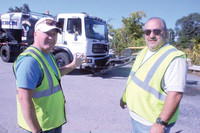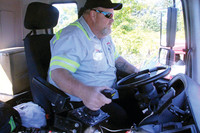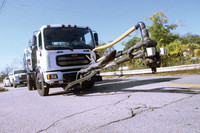By JOHN HOWELL The Pothole Killers visited Cranston last week. Resembling a mechanical praying mantis on wheels, the killer didn't have far to travel to find a pothole. By Rhode Island standards it was hard to even call it a pothole, rather it was more
This item is available in full to subscribers.
We have recently launched a new and improved website. To continue reading, you will need to either log into your subscriber account, or purchase a new subscription.
If you are a current print subscriber, you can set up a free website account by clicking here.
Otherwise, click here to view your options for subscribing.
Please log in to continue |
|



The Pothole Killers visited Cranston last week.
Resembling a mechanical praying mantis on wheels, the killer didn’t have far to travel to find a pothole. By Rhode Island standards it was hard to even call it a pothole, rather it was more of a blip in the pavement than something that might rupture a tire or swallow a car. But John Corso, Highway Maintenance Superintendent wanted to start on Wellington Avenue.
The killer went to work. The business end of the killer, an arm reaching out from in front of the cab ejected a gooey black spray that coated the cracked pavement. The spray was quickly followed by coarse gravel regurgitated from a second nozzle. It was all done in a couple of minutes without the driver leaving the cab or a crew to shovel cold or hot patch, depending on the season. Compaction is not required as the emulsion and aggregate fill the void.
“It’s sort of like popcorn,” Brian Rutledge said of the aggregate.
He said some municipalities sweep up the loose gravel, but he doesn’t find that necessary as it bonds to the road surface and smoothes out in less than a day. Rutledge, of Patch Management Inc. of Fairless Hills, Pa., said the company owns 70 of the machines that are leased or on contract across the country. Two of them are in Rhode Island under a contract with the Department of Transportation.
Rutledge said the killer can operate under virtually all weather conditions. The exception is when the temperature drops below 16 degrees. On average, Rutledge said, a killer can repair a pothole in three minutes and, at that rate, can do upwards of 100 a day.
Potholes are no stranger to Corso. Even at this time of year he has a two-man crew and a truck assigned to dealing with them. He said spring is the worst time of year for potholes, but even now the department gets calls.
“There’s zero waste,” Rutledge said of the system.
Also, according to data on the machine, a biodegradable agent is used that is re-circulated internally, meaning the pothole killer poses no storage or disposal liabilities. The vehicles are GPS equipped, not only making them easy to track but also for them to track down potholes.
Naturally, Corso was interested in the bottom line. Rutledge said Cranston could piggyback on the state contract. The city also has the option of whether to staff a vehicle or to contract for services. Rutledge offered the city fall preventative maintenance program using 50 tons of patching material over 10 days for a cost of $25,000. Given the estimate of 100 potholes a day, the city could fill 1,000 potholes at an average cost of $25 each.
For the moment, however, it appears the Pothole Killers won’t be hunting in Cranston.
Asked what the administration’s position is relative to contracting the service, Mayor Allan Fung said in a statement, “We appreciated the demonstration and will consider the service in the future if our cost analysis shows it’s a viable option to complement our annual road repair efforts. Much of our road repairs are performed in-house for cost savings and we will ensure any spending on contracts makes sense.”
Comments
No comments on this item Please log in to comment by clicking here